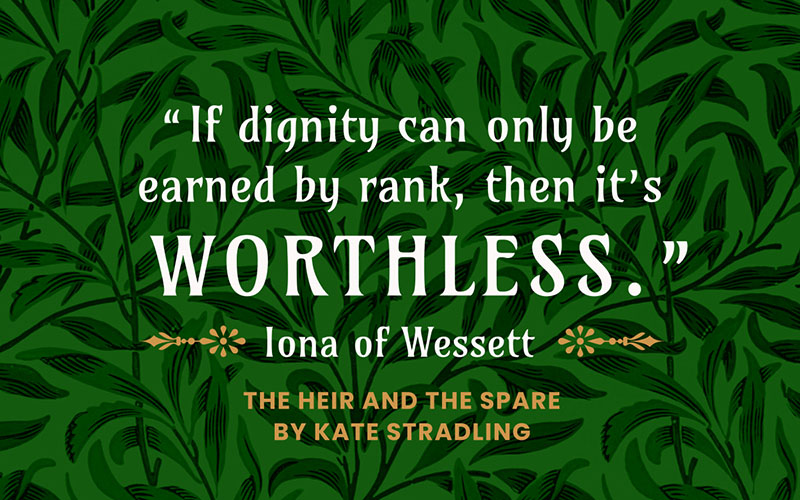Well, it’s been a year and some change, with 1000+ ratings on Amazon. I guess I’m ready to talk about THE HEIR AND THE SPARE. This is a four-part blog series, pulled from notes I compiled around the time the book released. The first three parts are character notes: Iona of Wessett, Jaoven of Capria, and Lisenn of Wessett. The fourth documents a few of my Easter eggs/inside jokes.
Long story short, SPOILER ALERT. If you haven’t read the book, consider yourself forewarned.
Princess Iona of Wessett

Iona lives in deep trauma. In fact, deep trauma is her normal, to the point that she doesn’t question the toxicity of her relationship with her sister, Lisenn. It’s how things have always been, so it must be how they’re supposed to be, somehow.
Lisenn’s behavior is so normalized that at the start of the book, that Iona mentally categorizes her and Jaoven as having the same degree of viciousness. This is demonstrably untrue. We learn from the narrative that
- Iona remained in Capria under adverse circumstances for four years solely to avoid Lisenn. If her school bullies were anywhere near as destructive, logically, she would have pulled rank and returned home.
- She also confronts Jaoven on multiple occasions (his original apology, in her studio the following morning, in the hallway after the card game, etc.) in a manner that she would never dare use with Lisenn, whom she actively avoids.
Thus, taking Iona at her word for how difficult her life was in Capria is a bit of a double-edged sword. Yes, she was bullied. No, it wasn’t anywhere near the level of what she experienced at home. This becomes more apparent toward the end of the book, when she inventories her memories of Lisenn. Prior to that, however, she operates under a certain amount of cognitive dissonance that’s worked into the narrative’s 3rd Limited Omniscent POV.
Basically, one of her survival mechanisms involves convincing herself that her sister isn’t that bad, that she can control the situation by avoiding Lisenn, and that she need only bide her time in her isolated corner of the castle until her next trip away from it. Much of the book involves the unraveling of that false internal narrative.
Clever Underdog Saves the Day?
Crafting a character in deep trauma comes with a peculiar set of difficulties. Iona is an introvert (as most of my main characters are, because extroverts are exhausting, haha). She’s clever—in a way that Clervie describes as “subversive”—so some readers might expect the “Clever Underdog Saves the Day” trope, where in the end she would pull some plan out of her mental aether and escape her difficulties by her own wits.
While this trope can be entertaining, if the underdog lives in deep trauma, it’s poisonous. It implies that people in situations of abuse should be smart enough to save themselves, which is an absolute garbage message.
In Survival Mode, any extra brain power goes toward surviving the next encounter with whatever threatens your peace of mind. It is mentally exhausting. And while yes, some people might pull their wits together enough to form a more permanent escape, it usually requires a whole support network to truly extract them from danger. We shouldn’t expect vulnerable individuals to Clever Underdog their way to safety.
And in Iona’s case, that particular narrative path would have destroyed her character arc.
No one is an island
The name “Iona” comes from an island off the coast of Scotland, which in turn is named after a derivative of the Old Norse ey, “island.” Yes, my heroine lives on an island, habitually isolates herself from others, and her name literally means “island.”
I pretty much slathered the symbolism with a trowel.
During the prep stage of this book, I came across the concept of extreme independence as a trauma response. And I was like, “Yep. That’s Iona in a nutshell.”
Thus, her character arc involves
- coming to recognize that there are people ready and willing to help her;
- learning to accept their help instead of always trying to do everything herself
This character arc holds immense importance to me. These are skills I’m trying to learn and trying to implement in my own life. No wonder they surfaced in my work.
Thus, she’s a damsel in distress, and intentionally so. It was important to me that she doesn’t save herself. There’s a time and place for “bootstrapping” heroines, but this novel was not it.
None of us should have to maneuver through this life depending only on our own strength or cleverness, and the world would be a much better place if we stopped expecting that of others.
I love that you make the case for a damsel in distress not saving herself. I think damsels get a bad rap and they, too, still have an important place, though they’ve gone out of fashion in fantasy. And I particularly love the idea that: “None of us should have to maneuver through this life depending only on our own strength or cleverness…” Learning to rely on and open yourself to trusting others is still an important takeaway for a book!
Thank you. I feel like, as readers, we need a whole spectrum of character types leading stories: the strong, independent ones who save the world, the damsels in distress who have to accept help, the quiet thinkers, the spastic doers, etc. Dismissing one type off-hand sends the unintended message that only certain people deserve to have their stories told.
Comments are closed.